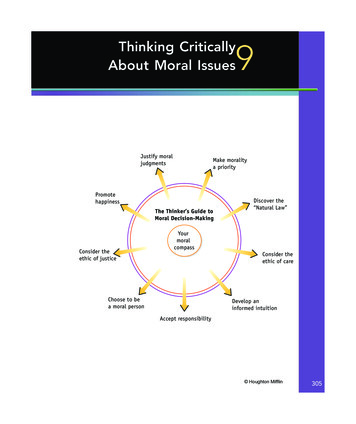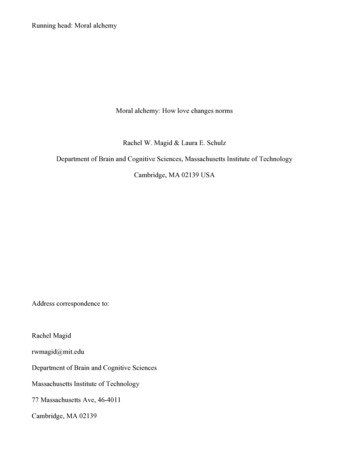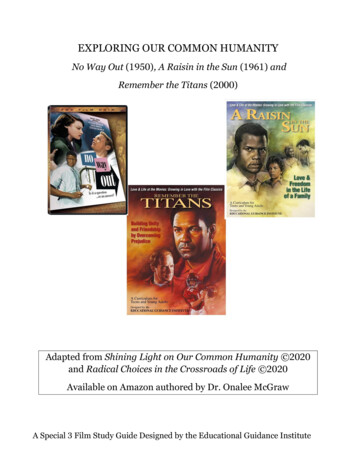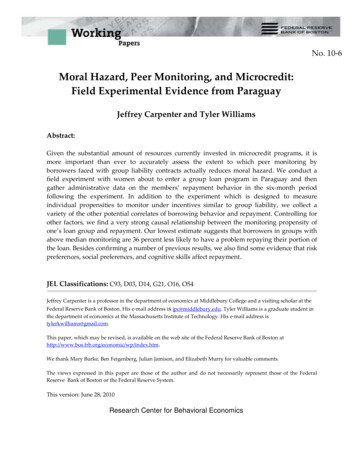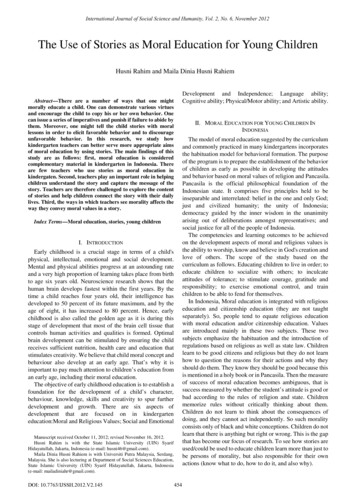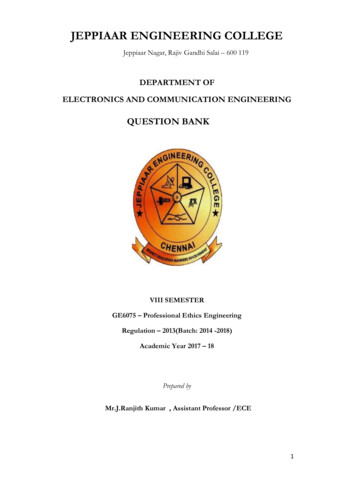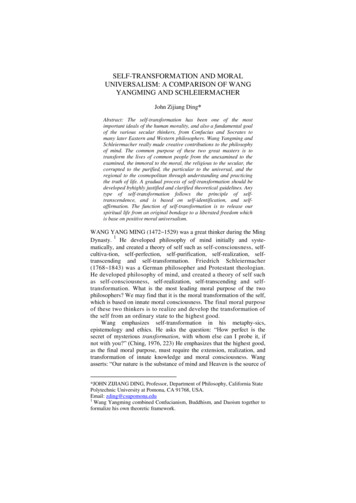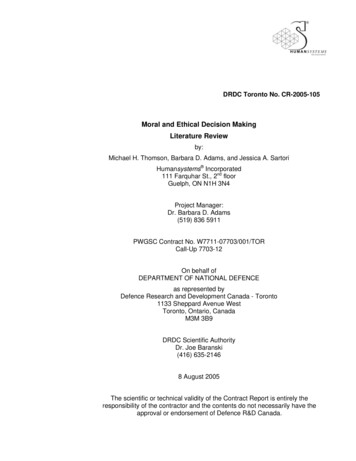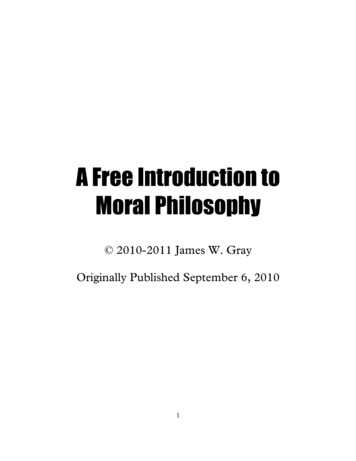
Transcription
A Free Introduction toMoral Philosophy 2010-2011 James W. GrayOriginally Published September 6, 20101
About this EbookThis ebook is still in the rough draft stage and it has not beensufficiently edited. It is made up of essays written on my philosophywebsite, Ethical Realism.My free ebooks are available here that offer many of my thoughtsinvolving philosophy.Updates:1. September 23, 2010: I made minor changes involving formattingand the inclusion of page numbers.2. May 31, 2011: I added a lot to the chapter on Normative MoralTheories and added new chapters on the nature of morality (themeaning of “morality,” the debate over moral realism, metaethical theories, and uncontroversial moral beliefs.3. September 3, 2011: I made several corrections and clarificationsto the early chapters.2
Table of ContentsPreface.6I. Introduction.7Chapter 1: What is “Morality?”.8What does “morality” mean?.8Moral and nonmoral standards.12Chapter 2: The Debate Over Moral Realism.15What is Moral realism?.15Is moral realism true?.20Chapter 3: Meta-Ethical Theories.22Moral naturalism.22Moral Intuitionism.23Emotivism.24Moral Relativism.25Error theory.26Chapter 4: Uncontroversial Moral Beliefs.29What are “highly plausible uncontroversial beliefs?”.29Why are uncontroversial beliefs important?.30Six uncontroversial moral beliefs.31Chapter 5: 10 Myths about Morality.361. Morality is a matter of opinion.362. All opinions about morality are equal.383. It is impossible to reason about morality.394. It is impossible to have moral knowledge.395. There are no justified moral beliefs.406. The situation isn't relevant to morality.417. Objective morality requires God.438. We have no reason to be moral unless God exists.439. Either morality comes from God or relativism is true.4410. Either morality is relative or absolute.44Chapter 6: Morality, God, Relativism, & Nihilism.46How I view morality.46Objective morality requires God.47Morality is relative.48Nothing really matters.493
Conclusion.51Chapter 7: Moral Absolutism, Relativism, & The Situation.521. Morality is part of the world.532. We can reason about morality.533. The situation can be relevant to morality.54Conclusion.57Chapter 8: Does Evolution Adequately Explain Morality?.58It doesn't tell me that intrinsic values exist.59The Naturalistic Fallacy.59It doesn't tell me that being moral is rational.60Conclusion.61Chapter 9: How to Become Moral.62Rationality.62Intellectual virtues.63Moral theories.63Moral knowledge.64Appropriate thoughts.64Close relationships.65Experience.66Spiritual exercises.66Conclusion.67II. Moral Reasoning.68Chapter 10: Can We Reason About Morality?.68Uncontroversial moral truths.68Analogies.70Thought experiments.71Theoretical virtues.72Chapter 11: Moral Reason.76Uncontroversial moral truths.76Analogies.78Thought experiments.79Theoretical virtues.80Chapter 12: Normative Moral Theories.83Utilitarianism.83Categorical Imperative.87Aristotelian Virtue Ethics.91Stoic Virtue Ethics.944
Ross's Intuitionism.98Conclusion.102III. Applied Ethics.103Chapter 9: Reckless Driving.103Tailgating.103Blocking paths.104Lane sharing.106Conclusion.107Chapter 10: Is Atheism Immoral?.108Atheists are despised.108Two ways people think atheism is immoral.109Arguments that atheism is not immoral.110Arguments people use to conclude that atheism is immoral.113Conclusion.118Chapter 11: Is Homosexuality Immoral?.120Major Ethical Theories.120Arguments Against Homosexuality.123Conclusion.133Chapter 12: Are Muslims Immoral?.134An Introduction to Bigotry.134Evidence of Anti-Islamic Bigotry.137Myths about Islam.139Conclusion.143Chapter 13: Is Fantasy, Such as Dungeons & Dragons or HarryPotter, Immoral?.144Are people against fantasy?.144Why are people against fantasy?.145Conclusion.152Conclusion.1535
PrefaceThis book not only debunks many common myths about morality, butit introduces rational moral thinking and a philosophicalunderstanding of moral reasoning. If we want to know what reallymatters in the world, if abortion should be legal, or if homosexuality iswrong, we should study moral philosophy and learn to think like amoral philosopher.This ebook is divided into the following three parts:1. I discuss the nature of morality.2. I discuss how to become good and moral reasoning. Once werealize that we are morally flawed just like everyone else, weshould find out how we can improve ourselves. This has atheoretical component that philosophers specialize in—moralreasoning. We should find out how to reason about moralitywithout the flaws of everyday moral thinking. We can't try to dothe right thing if we don't even know what it is, and we learnabout right and wrong using moral reasoning. Thinking like amoral philosopher can help us understand right from wrong inorder to help us determine what counts as right or wrong.3. I discuss applied ethics—I apply moral reasoning to varioustopics. Once we know how to think like a moral philosopher wecan try to determine if something is right or wrong. For example,atheism, homosexuality, and Islam are three things peoplecommonly disapprove of, but are they really immoral?6
I. IntroductionThis book introduces moral philosophy. There are three major areas ofmoral philosophy:1. Meta-ethics – Research concerning the nature of morality. Ittries to answer question, such as: What does “good,” “right,” or“justice” mean? What makes something good or right? Is moralrealism true? Is morality irreducible, cognitive, or overriding? Dointrinsic values exist?2. Normative theory – How do we decide if something is right orwrong?3. Applied ethics – Is x right or wrong? (e.g. Is capital punishmentright or wrong?)In this first section I will discuss the nature of morality including whatmorality is about and the characteristics of morality. Ethics is the“philosophy of morality” and “meta-ethics” is the study of moralreality, moral knowledge, moral language, and moral psychology. Itinvestigates the question, “What's moral philosophy all about?” Andmany other related question, such as theses:1. What does 'good' and 'bad,' 'right' and 'wrong,' or 'justice' referto?2. Are any moral judgments true?3. Are there moral facts?4. Are any moral beliefs rational or justified?5. Can we attain moral knowledge?6. How do we know when a moral judgment is probably true orrationally justified?7. Does anything have intrinsic value (value just for existing), or areall values based on our personal desires and interests?7
Chapter 1: What is “Morality?”People discuss morality quite often and many of our actions are basedon assumptions about morality. I will discuss the meaning of“morality” within ordinary language and illustrate the differencebetween morality and everything else by comparing moral andnonmoral standards.What does “morality” mean?Morality involves what we ought to do, right and wrong, good andbad, values, justice, and virtues. Morality is taken to be important;moral actions are often taken to merit praise and rewards, andimmoral actions are often taken to merit blame and punishment.What we ought to do – What we morally ought to do is what's morallypreferable. It's morally preferable to give to certain charities and torefrain from hurting people who make us angry; so we morally oughtto do these things.Sometimes what we ought to do isn't seen as “optional.” Instead, weoften think we have moral duties (obligations). It might not be a moralduty to give to any charities, but it seems likely that we often have aduty not to hurt people.Nonetheless, what we ought to do doesn't just cover our obligations.It's possible to do something morally preferable that's not wrong. Forexample, we can act “above the call of duty.” Some actions are heroic,such as when we risk our life to run into a burning building to save achild. Some philosophers call actions that are above the call of duty“supererogatory” rather than “obligatory.”Right and wrong – Something is morally right if it's morallypermissible, and morally wrong if it's morally impermissible. Forexample, it's morally right to help people and give to certain charities,8
but morally wrong to kill people indiscriminately.Good and bad – “Good” and “bad” refer to positive and negativevalue. Something is morally good if it helps people attain something ofpositive value, avoid something of negative vale, or has a positive valuethat merits being a goal. For example, food is good because it isnecessary to attain something of positive value because it helps ussurvive; and our survival could have positive value that merits being agoal. Something is morally bad if it makes it difficult to attainsomething of positive value, could lead to something of negative value,or has a negative value that merits avoidance. For example, starvationis bad because it could lead to suffering; and suffering could havenegative value that warrants its avoidance.Something has “instrumental moral value” if it is relevant to achievingmoral goals. Food is instrumentally good because it helps us achieveour goal to survive; and starvation is instrumentally bad when we havea goal to avoid suffering, and starvation makes it more difficult for usto achieve this goal.We take some of our goals to be worthy as “moral goals” for their ownsake rather than being instrumental for the sake of something else.These goals could be taken to be worthy for having positive value (orhelp us avoid something of negative value)—what Aristotle calls “finalends” or what other philosophers call “intrinsic values.”Imagine that someone asks you why you have a job and you say it's tomake money. We can then ask why you want to make money and youcan reply that it's to buy food. We can then ask why you want to buyfood, and you can reply that it's to survive. At this point you might nothave a reason to want to survive other than valuing your existence forits own sake. If not, then we will wonder if you are wasting your timewith a job. All of our goals must be justified at some point bysomething taken to be worthy as a goal for its own sake, or its not clearthat any of our goals are really justified.Final ends – Final ends are goals that we think are worthy. Pleasure,9
survival, and knowledge are possible examples of goods that should betaken to be promoted as final ends. Some final ends are also meant tohelp us avoid something of negative value, such as our goals to avoidpain and death. The goals of attaining these goods are “final ends.” Itis possible that final ends are merely things we desire “for their ownsake” but some final ends could be better and of greater importancethan others. Aristotle thought that our “most final end” or “ultimateend” is happiness and no other good could override the importance ofhappiness.Final ends seem relevant to right and wrong. It seems morally right totry to achieve our final ends because they are worthy. All things equal,it seems morally right to try to attain happiness and survive.Intrinsic values – Intrinsic values are things of positive or negativevalue that have that value just for existing, and some philosophersthink Aristotle's truly worthy final ends have intrinsic value. The maindifference here is that final ends could merely be psychological—whatwe take to be worthy goals, but a goal has intrinsic value only if itreally is worthy. Some people might have “final ends” but actually bewrong about what goals are worthy of being final ends.We can desire intrinsic values “for their own sake,” many think it'srational to often try to attain things that are intrinsically good, andwhatever is intrinsically good is good no matter who attains it. Forexample, if human life is intrinsically good, then survival is good forevery person.Intrinsic value plays the same role as final ends—we think it's oftenmorally right to try to achieve goals that help people attain intrinsicgoods and we morally ought to do so. However, intrinsic values canconflict. If pain is intrinsically bad, that doesn't mean we should neverallow ourselves or others to experience pain because there might beintrinsic goods that can be attained as a result of our pain. Forexample, homework and learning is often painful, but the knowledgeattained can help us live better lives and could even be intrinsicallygood for its own sake.10
Justice – Justice refers to our interest in certain ethical issues such asequality, fairness, and merit. It is unjust to have slavery or to havedifferent laws for different racial groups because people should beequal before the law, it's unfair, and racial groups don't merit unequaltreatment before the law. It is just to punish all people who break thelaw equally rather than let certain people—such as the wealthy—breakcertain laws that other people aren't allowed to break. Additionally, it'sunjust to punish the innocent and to find the innocent guilty in a courtof law.Virtues – Some people are better at being moral than others. It'simportant that we know the difference between right and wrong, attainthe skills necessary to reach demanding moral goals, and find themotivation to do what is morally preferable. For example, courage is avirtue that involves knowledge of right and wrong, skills, andmotivation. Courage requires us to endanger our personal well beingwhen doing so is morally preferable, to have skills that make it possibleto endanger our personal well being in many situations, and to havethe motivation to be willing to endanger our well being when we oughtto do so.Praise and blame – We often think that moral behavior merits praiseand immoral behavior merits blame. It often seems appropriate to tellpeople who have done good deeds, such as saving lives, that weappreciate it and that what they are doing is good; and it often seemsappropriate to tell people who have done something immoral that wedon't appreciate it and that they did something morally wrong.Additionally, it generally seems appropriate to hold people responsiblefor their actions and let them know that their actions could have beendifferent.Reward and punishment – One way to hold people responsible fortheir actions is to reward and punish them for their behavior, and thisoften seems appropriate. We could give gifts or return favors to peoplewho help us, and break our friendship or ignore those who dosomething immoral. For example, a company that scams people11
should be held responsible and punished by consumers who decide tono longer do business with that company.Sometimes punishments could be severe and could seem immoral inany other context. For example, it might be morally justified to throwmurderers in prison even though it would be an immoral example ofkidnapping and imprisonment in many other contexts. We can't justthrow anyone in prison that we want.Moral and nonmoral standardsNot everything is morally right or wrong. Sometimes something isentirely nonmoral and irrelevant to morality—such as standing on yourhead or counting blades of grass. One way to clarify what “morality”refers to is to compare and contrast it to nonmoral things that aresometimes confused with it.What we morally or nonmorally ought to do – We don't just talk aboutright and wrong, good or bad, or what we ought to do in moralcontexts. This is because there is both moral and nonmoralinstrumental value.1. Moral instrumental value – We ought to do what is necessary toattain moral goals. For example, we morally ought to get a joband buy food to stay alive. It's morally right to get a job and buyfood, and food has moral instrumental value insofar as it helpsus attain our moral goal of survival.2. Nonmoral instrumental value – Not all instrumental value helpsus achieve moral goals. We can also have personal goals thathave (almost) nothing to do with morality. For example, I mighthave a goal of standing on my head and taking gymnasticsclasses could be what I ought to do to achieve this goal. Theright thing to do to be able to stand on your head is to takegymnastics classes, even though it has nothing to do withmorality. Additionally, some instrumental values could even beimmoral. For example, I might have a goal to murder someone12
and I could say I ought to use a gun if that's the best way tomurder someone. That's not to say that I morally ought tomurder anyone.Etiquette – Etiquette tells us how to be polite and show respect withina culture. Etiquette tells us not to chew our food with our mouthsopen, to open doors for people, and not to interrupt people who aretalking. Sometimes being rude and impolite can be morally wrong, butthe fact that etiquette and morality sometimes overlap doesn't meanthey are identical or that etiquette is always relevant to morality. First,etiquette tends not to be serious enough to be morally relevant.Burping in the US is considered rude, but it would be strange to sayit's ever morally wrong. Second, it's often morally right to be rude.Many people think that questioning someone's moral qualificationsand moral opinions is rude, but it's often the morally preferable thingto do because it's essential that we have the best moral opinionspossible and sometimes it's a good idea to help people improve theirmoral opinions. The importance of helping people be moral canoverride the importance of showing the superficial signs of respectassigned within a culture. Such signs of respect are often arbitrary andcan conflict with more important ways of showing respect—such as therespect we show people when we assume that people have a concern tomorally improve themselves.Law – The law tells us what we are or are not allowed to do, andbreaking the law often leads to punishment. What's legal is often basedon what's moral, but not always. For example, it's illegal and immoralto murder people. However, the fact that legality and morality canoverlap doesn't mean they are identical. It was once illegal to freeslaves, but that doesn't mean it was morally wrong; and it can be legalfor a company to pollute or dump toxic waste, but that doesn't meanit's morally right to do so.It's hard to pinpoint what morality is about, but we often discussmorality with ease anyway. There are many related ideas concerningmorality, such as what we ought to do, right and wrong, and justice;but these ideas often have a nonmoral counterpart. This seems clearwhen we compare moral and nonmoral instrumental value. Moreover,13
etiquette and law are often confused with morality, but they are notidentical to morality. What's polite or legal is often moral, but notalways. What's bad etiquette or illegal can be moral as well.14
Chapter 2: The Debate Over Moral RealismThe question over what morality refers to has led to two groups ofphilosophers. One group describes itself as being “moral realists” andother other as “moral anti-realists.” Moral realists think that there'smore to morality than anti-realists. In particular, the moral realistsbelieve that there's at least one moral fact. I will describe these twogroups then briefly describe why someone might accept or reject moralrealism.What is Moral realism?There is no precise definition of moral realism that all philosophersagree to, but moral realists agree that anti-realists are givingincomplete meta-ethical theories because moral realists believe in atleast one “moral fact.” Other than that, moral realists tend to beoptimistic about attaining moral knowledge, identifying true moralstatements, and often believe in intrinsic values.Moral facts – The difference between “truth” and “facts” is thatstatements are true, but facts are the (parts of) reality that at leastsometimes make statements true (by corresponding to them). Forexample, when I say that I have a foot, what I say is true becausethere's a real foot in the world that's part of my body. However, not allfacts are objects like feet. Examples of moral facts could be thefollowing:1.2.3.4.Pain is intrinsically bad.We ought not cause pain without an overriding reason to do so.It's rational to try to avoid causing unnecessary pain to people.It's wrong to torture people without an overriding reason to doso.5. Socrates was a good person.6. Socrates had courage.15
Facts can be any part of reality, such as objects, properties, relationsbetween things, states of affairs, and events.1. Parts of reality – We assume that things exist in space and time,but not everything is an object. For example, parts of reality canbe thoughts or feelings, but thoughts and feelings aren'tnecessarily objects.2. Objects – Objects are unities that are taken to exist apart fromother unities. A foot can be taken to be an object unified andsomewhat distinct from our other body parts even though it'stechnically unified with the rest of our body. It's not entirelyclear if any object is truly unified in any meaningful sensebecause the universe is made up of fields and particles, but it'sconvenient to talk about objects and we often understand whatpeople say who discuss them.3. Properties – Properties are elements of things, such as length,color, strength, and courage. It's not clear that all properties arereally the same kinds of things. Length is a comparison betweenthings, color is how light reflects off of objects; strength is what abody can do; and courage is a relationship between morality,body, and mind that involves bodies doing what is morallypraiseworthy because the mind is motivated to do so.4. Relations between things – Objects and things are ofteninterrelated and those relationships can be important to us. Thefact that one object in conjunction with the laws of nature cancause something to happen is often very important. For example,we eat food to survive and this involves a complexinterrelationship between our bodies, food, and the laws ofnature.5. States of affairs – States of affairs are all the facts—the totalreality—that's relevant to us when we make a truth claim. Onereason we think we should eat food is because the states ofaffairs including our bodies and the food will undergo a causalprocess and lead to greater health and longevity.6. Events – States of affairs exist in time and the reality that existschanges from one moment to the next. We often convenientlydiscuss “events” to pinpoint the parts of reality that change and16
interests us. For example, we can speak of the event of a gunbeing fired or the events that lead to high oil prices.Are moral facts irreducible? – Moral facts of the moral realist varietycan't be eliminated through reduction. We often find out that onething is actually something else. We often eliminate the existence ofsomething through a reduction. For example, we might say thathuman beings are nothing but particles and energy. We could thenstop talking about human beings and just talk about certainconfigurations of particles and energy. Some people also suggest thatthe mind is nothing but the brain.Some people have suggested that morality is nothing but culturalcustoms, preferences, or a social contract. This is a paradigmatic sortof moral anti-realism. Moral realists require that moral facts are morethan just cultural customs, preferences, or a social contract.However, some sorts of reduction are not eliminative. For example,some philosophers think that pain is identical to badness, but theydon't think we can eliminate pain. They think that pain and badnessare two different ways to see the same thing. This is much like howpeople claim that H2O is identical to water, but they don't claim that“water doesn't really exist.”Intrinsic value – One good candidate for being a “moral fact” thatseems to explain other moral facts is “intrinsic value”—the idea thatsomething could be good or bad just for existing. For example, it canbe a fact that (some) pain is intrinsically bad. As a result we might alsodecide that the following are moral facts:1. It's wrong to cause people pain indiscriminately.2. It's appropriate for people to dislike pain and to desire to avoidpain.3. It's appropriate to be angry at people who cause others painindiscriminately.4. It's appropriate to feel guilt, regret, or shame when we wronglycause other people pain.17
5. We ought to consider the pain our actions can cause peoplebefore deciding on a course of action.6. It's courageous to be willing to undergo pain (e.g. jump in aburning building) to help many other people avoid pain (e.g.help them out of a burning building).The relationship between these ideas and intrinsic value involvesinstrumental facts. It's a fact that a person ought to take a gymnasticsclass to learn to do cartwheels even though there is no object called“rightness” in the world. What makes it right is merely that it's a goodmeans to an end—it's a good way for us to accomplish o
Sep 06, 2010 · I. Introduction This book introduces moral philosophy. There are three major areas of moral philosophy: 1.Meta-ethics – Research concerning the nature of morality. It tries to answer question, such as: What does “good,” “right,” or “justice” mean? W
